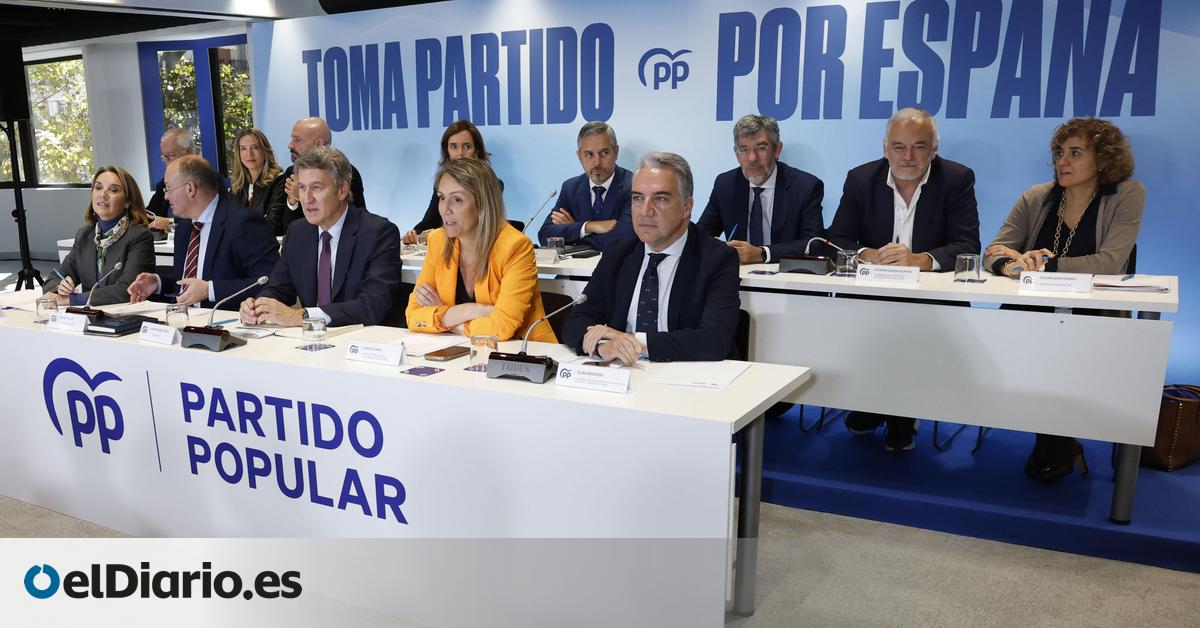
The paradox has been repeated since the Popular Party left La Moncloa in 2018: the emergence and reinforcement of Vox forces the party now in the hands of Alberto Núñez Feijóo to depend on that of Santiago Abascal to be able to maintain power or achieve it in different administrations while, at the same time, both forces compete and carry out a fierce fight for the same electorate. Feijóo’s first decision when he became president of the PP after exiling Pablo Casado was to endorse a government in coalition with the extreme right in Castilla y León. What for the moment is the last has consisted of leaving in the hands of Vox the continuity or not of a right-wing government in the Valencian Community. The square is one of the jewels of conservative power and the leader of the PP has endorsed that Carlos Mazón resigns to continue as president without naming a replacement, so that the popular Valencians, who do not have an absolute majority in Les Corts, must agree with the extreme right on the new candidate. All of this, at the doors of a new electoral cycle, with what it implies.
Feijóo submits to Vox at a good time for those from Abascal and about to begin a carousel of elections on December 21, with the regional elections of Extremadura. Then the Andalusian and Castilla y León ones will arrive, in addition to the municipal ones and, later, the general ones, in principle in 2027, as the President of the Government, Pedro Sánchez, repeats every time he has the opportunity. The extreme right has been setting the agenda of the PP for months now, which has had to assume some of Vox’s most ultra postulates on sensitive matters such as Equality or immigration to try to stop voter flight. And Abascal’s party continues to grow in the polls while the popular party stagnates.
In this scenario, it is to be expected that the Vox leadership will sell dearly its support for any PP candidate to replace Mazón at the head of the Consell. The ultra formation has already made it clear, in addition, that in case there is no agreement it does not fear elections in the Valencian Community, where the erosion of the management of the dana by the Mazón Executive has boosted the extreme right, according to all the surveys. For the moment, in the first conversations held by the leaderships of both parties last week, Vox has already revealed that its demands for electing a new president involve the PP assuming its denialist agenda on climate change as well as its xenophobic positions regarding migrants.
On Friday, a new secret meeting was held in Valencia with representatives of the national leadership of Vox and the PP of the Valencian Community, which served, according to both parties, to “verify good will to negotiate.” Vox conveyed the need for the PP “to decide who is going to be its new candidate for the Generalitat Valenciana so, once appointed, it can explore with him its willingness to agree on policies that allow it to continue with the reconstruction of the Valencian Community and its defense against the destructive policies of Pedro Sánchez.” And, on Sunday, Feijóo considered that “everything will turn out well” in the negotiations, according to Europa Press, although Abascal, over the weekend, made it clear that Vox does not fear elections in the Valencian Community.
If during these negotiations the popular ones accept Vox’s postulates, the extremist agenda will be the PP’s presentation agenda for the new electoral cycle. And all of this will make even more difficult the image of a focused and moderate party that Feijóo has tried without success to defend practically since he settled in Madrid, but which he has not been able to materialize due to the competition with the extreme right that has forced him to turn ideologically in numerous aspects and that causes internal quarrels between the most radical and most moderate sectors of the party.
The alliances still in force
In addition to hundreds of small town councils, PP and Vox govern in coalition in such important places as the city of València, Burgos, Valladolid, Ciudad Real, Móstoles or Alcalá de Henares and the PP still depends on the votes of the Abascal party to be able to legislate in autonomous communities such as Aragón, Castilla y León, the Region of Murcia and the Balearic Islands. In all four, along with Extremadura, the two parties also governed in coalition until in July 2024 Vox decided to leave the executives due to the initial approval of the Feijóo leadership to welcome migrant minors into their communities. The balance of these forced alliances has translated into cuts in rights mainly of women, migrants or the LGTBIQ+ collective, in addition to democratic memory.
In the last week, the main leaders of the PP have once again been forced to balance with Vox. Feijóo incorporates the lessons of José María Aznar every time they coincide and the former president always asks him to move away from “populism”, which also encompasses the extreme right. The former president told him directly at the presentation of his book on October 30. And he repeated it this Friday, during an event at a Catholic university in Madrid. “Polarization leads to polarization,” Aznar warned him, who considered “it is very important that the PP governs by ensuring that half of [de España] Don’t hate the other half.”
Genoa 13, on the other hand, continues to take a hard line to try to win votes on the extreme right. But now the priority of Feijóo’s leadership is to maintain the government of the Valencian Community, which has precipitated the thaw of the relationship between the PP leader and Abascal. The two spoke on Tuesday, without any progress being made in finding a replacement for Mazón. On Monday, before the PP Executive Committee, Feijóo himself expressly asked the extreme right to be “up to the task” and “facilitate as soon as possible” the election of the new president of the Generalitat, since, as he said, it is the “most urgent” political task. The message has been repeated throughout the week by other members of the national leadership of the PP, such as the general secretary of the party, Miguel Tellado, who asked Vox to “avoid” elections because “no Valencian would understand” that the reconstruction would now be “paralyzed” after the damage caused by the electoral process.
Vox, meanwhile, is trying to safeguard its privileged position in the negotiation by maintaining a harsh tone regarding Feijóo’s leadership. In an interview in La Vanguardia published this weekend, Abascal claimed to be “accustomed” to the PP trying to “deceive” them and “not fulfilling their commitments.” “In fact, we had to abandon regional governments,” he recalled. That is why now at Vox they will be “much firmer and much more demanding” when it comes to negotiating with them the Valencian presidency, but also the governments that may depend on the extreme right in the new electoral cycle. “We have a political position and whoever we reach an agreement with will have to assume that part of our political positions,” insists the Vox management. “We are never afraid of elections and we are also not afraid that the PP will make the decision to go to one: if they call, we will accept it, we will present ourselves with our candidates and, above all, with our ideas,” warns Abascal.
A changing discourse on Vox
It is significant that Vox has appointed one of its most radical leaders, Ignacio Garriga, as a negotiator to choose a replacement for Mazón in the Valencian Community. Recently, Garriga directly accused the PP of being responsible for “Spain being mired in an invasion of illegal immigration.” “The Spaniards are aware of who is guilty and it is the PP,” he remarked. Abascal, for his part, has come to blame the PP “and its media terminals” for alleged attacks that its leaders have suffered in recent weeks, for “repeating,” according to him, “the messages of demonization that promote and justify that violence.”
Feijóo tried to establish doctrine on the relationship with Vox last July during the closing of his re-election congress. The opposition leader promised not to create a “cordon sanitaire” to the extreme right, but he did say he “wanted” to govern alone. The satisfaction in his team was total because they thought they had settled the issue definitively. But both assertions quickly became old. The wish expressed by Feijóo is far from being fulfilled, according to the many surveys that are published every week.
At the return of summer, the PP raised its tone against Vox and both parties entered into direct confrontation, although, at the same time, Feijóo accelerated the assimilation of its proposals and speeches. Given the negotiation in the Valencian Community and the upcoming electoral cycle, Génova 13 has once again moderated its speech about the extreme right, which it needs to replace Mazón and which it will foreseeably depend on to govern communities and city councils in the near future.
Source: www.eldiario.es

